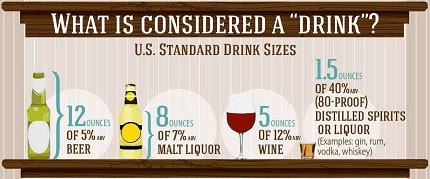Pumping When Baby Does Not Want to Drink After Vaccines
Alcohol
Not drinking alcohol is the safest option for breastfeeding mothers. However, moderate alcohol consumption (up to 1 drink/day) is not known to be harmful to the infant.
What is "moderate consumption"?
The Dietary Guidelines for Americans defines moderate consumption for women of legal drinking age as up to 1 standard drink per day.
What is a "drink"?
The Dietary Guidelines for Americansexternal icon defines a standard "drink" as 12 ounces of 5% beer; 8 ounces of 7% malt liquor; 5 ounces of 12% wine; or 1.5 ounces of 40% (80 proof) liquor. All of these drinks contain the same amount (i.e., 14 grams, or 0.6 ounces) of pure alcohol. However, many common drinks contain much more alcohol than this. For example, 12 ounces of 9% beer contains nearly the same amount of alcohol as two (1.8) standard drinks. Consuming one of these drinks would be the equivalent of two standard drinks.

Is it safe for mothers to breastfeed their infant if they have consumed alcohol?
Not drinking alcohol is the safest option for breastfeeding mothers. Generally, moderate alcohol consumption by a breastfeeding mother (up to 1 standard drink per day) is not known to be harmful to the infant, especially if the mother waits at least 2 hours after a single drink before nursing. However, exposure to alcohol above moderate levels through breast milk could be damaging to an infant's development, growth, and sleep patterns. Alcohol consumption above moderate levels may also impair a mother's judgment and ability to safely care for her child.
Drinking alcoholic beverages is not an indication to stop breastfeeding; however, consuming more than one drink per day is not recommended.
Can alcohol be found in breast milk?
Yes. Alcohol levels are usually highest in breast milk 30-60 minutes after an alcoholic beverage is consumed, and can be generally detected in breast milk for about 2-3 hours per drink after it is consumed. However, the length of time alcohol can be detected in breast milk will increase the more alcohol a mother consumes. For example, alcohol from 1 drink can be detected in breast milk for about 2-3 hours, alcohol from 2 drinks can be detected for about 4-5 hours, and alcohol from 3 drinks can be detected for about 6-8 hours, and so on. However, blood alcohol levels and the length of time alcohol can be detected in breast milk after drinking will depend on a number of factors, including the amount of alcohol consumed, how fast the alcohol is consumed, whether it is consumed with food, how much a mother weighs, and how fast alcohol is broken down in a mother's body.
What effect does alcohol have on a breastfeeding infant?
Moderate alcohol consumption by a breastfeeding mother (up to 1 standard drink per day) is not known to be harmful to the infant, especially if the mother waits at least 2 hours before nursing. However, higher levels of alcohol consumption can interfere with the milk ejection reflex (letdown) while maternal alcohol levels are high. Over time, excessive alcohol consumption could lead to shortened breastfeeding duration due to decreased milk production. Excessive alcohol consumption while breastfeeding could also affect the infant's sleep patterns and early development.
Alcohol and Caregivers
Caring for an infant while intoxicated is not safe. Drinking alcohol could impair a caregiver's judgement and his or her ability to safely care for an infant. If a caregiver drinks excessively, he or she should arrange for a sober adult to care for the infant during this time.
Can expressing/pumping breast milk after consuming alcohol reduce the alcohol in the mother's milk?
No. The alcohol level in breast milk is essentially the same as the alcohol level in a mother's bloodstream. Expressing or pumping milk after drinking alcohol, and then discarding it ("pumping and dumping"), does NOT reduce the amount of alcohol present in the mother's milk more quickly. As the mother's alcohol blood level falls over time, the level of alcohol in her breast milk will also decrease. A mother may choose to express or pump milk after consuming alcohol to ease her physical discomfort or adhere to her milk expression schedule. If a mother decides to express or pump milk within two hours (per drink) of consuming alcohol, the mother may choose to discard the expressed milk. If a mother has consumed more than a moderate amount of alcohol, she may choose to wait 2 hours (per drink) to breastfeed her child, or feed her infant with milk that had been previously expressed when she had not been drinking, to reduce her infant's exposure to alcohol. Breast milk continues to contain alcohol as long as alcohol is still in the mother's bloodstream.
Pumping When Baby Does Not Want to Drink After Vaccines
Source: https://www.cdc.gov/breastfeeding/breastfeeding-special-circumstances/vaccinations-medications-drugs/alcohol.html
0 Response to "Pumping When Baby Does Not Want to Drink After Vaccines"
Post a Comment